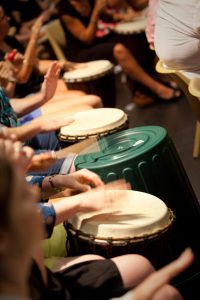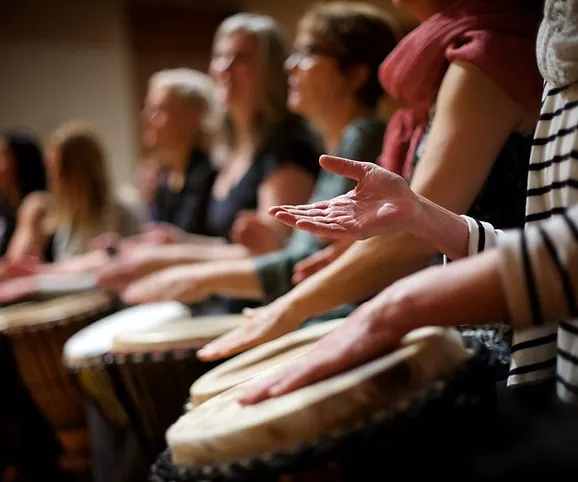Over the years, I’ve come across many posts—most recently from someone I’ve never met in person but with whom I’ve established an online rapport, sharing ideas and perspectives. These posts often discuss experiences at drum circles, where everyone seems to come together to create a single heartbeat, a moment of unity that feels profoundly spiritual.
I love the sound of this, but does this really happen?
The idea of feeling or hearing each other’s heartbeat as we play resonates deeply with me; it sounds incredibly wonderful and attractive. I am a sucker for romance!
While I’ve attended several drum circles in the past, I’ve only participated occasionally in recent times. What puzzles me—and I ask this sincerely—is why I have yet to experience this magical connection others describe. Is it my tendency to need control, my expectations, or perhaps my reluctance to let go and surrender to the moment? Or is this magical experience only happening in peoples minds?
I recall that on a few occasions when I consumed edibles, I could at least relax and drop my expectations, allowing myself to enjoy the chaotic sound of collective drumming. However, those positive experiences faded after a while. It never lasts. And then it’s back to reality.
Whenever I watch videos of my local drum circle, it seems largely unchanged week after week, month after month, year after year. I often notice disjointed playing, with everyone seemingly lost in their own rhythm rather than harmonizing as a group. I know this sounds judgmental but this is what I see. People are stuck, and either don’t know it, don’t care or don’t know better. Hey, ignorance is bliss, right?

In past conversations where I’ve raised similar concerns, I’ve encountered romanticized explanations, yet when I request videos of those sessions, I still fail to see, hear, or feel the connection others insist exists. Even after I write this article I get people telling me, “oh, it happens all the time you just can’t film it”.
It’s easy for some to dismiss my inquiries and suggest that I simply shouldn’t attend, and while I understand their defensive posture, I’m left questioning why I’m missing out on these supposed magical moments.
Recently, while watching a video of familiar drummers in a garage setting—one that could have been filmed last week or ten years ago—I reached out to a friend and fellow student who regularly participates. I asked him how he, with his extensive experience in West African dance and Afro-Cuban jam sessions, managed to find joy in it all. He mentioned that he tunes everyone else out.
Reflecting on this, I thought back to my own experiences with West African drummers in dance classes. In the late 70s and early 80s, we didn’t know many rhythms, and likely played several incorrectly.
The environment was strict: if you couldn’t play with conviction and maintain a groove, you were out. However, later on some years later, when West African drum teachers began to appear, they introduced a more relaxed atmosphere. Perhaps we all sounded off to them, even those of us confident in our skills, but the drumming for dance classes became open, welcoming even absolute beginners. It may simply have been a matter of survival for them. Beginners come to classes.
In these dance classes, we’d have master teachers, skilled dancers, and advanced drummers alongside novices who struggled to keep time. The dance instructor or lead drummer might intervene occasionally, but for the most part, The drum masters would always shine amid the chaos. It dawned on me how peculiar it was that they never expressed frustration about the disorganization. And as soon as the class or performance was over it was on to the next thing. Never getting stuck about what went wrong or right.
My student’s comment about tuning everything out struck me; he could fully immerse himself regardless of the surrounding noise. In contrast, I admit I often feel a physical aversion when approaching drum circles. Even if I attempt to draw near, a sense of discomfort arises within me.
Please understand, my intention isn’t to criticize drum circles; rather, I’m genuinely curious. How do others enjoy these experiences? How do they manage to tune out others while remaining engaged in their own rhythm? I lack that skill, but I wonder about the dynamics at play. I think about the group leader: what might happen if they paused to suggest everyone try playing a single rhythm together? Would it disrupt the joy they find in the disharmony? Why do individuals return to these sessions week after week?
It’s a fascinating inquiry, as I know everyone has their own reasons for drumming—many engage for fun, and some may resist being directed. Yet, with just a little guidance, the experience could be elevated significantly. I’m left pondering the heart of the matter: how to cultivate an atmosphere of collaboration and bliss amidst the sound of diverse rhythms.
It’s clear that this topic touches everyone in different ways, and while we may not always agree – sometimes even partially – that doesn’t really matter. What matters is that we share a love for drumming and hopefully a respect for one another.
It’s important to see the similarities rather then our differences when it comes to drumming because we all need to band together.
Respect is essential, no matter where we are or what style of drumming we practice.
From my experience, West African dance classes or drum classes that incorporate dance enhance our connection to the music and deepen our understanding of rhythm. And let’s not forget that the roots of the drum are deeply intertwined with African culture, which deserves our respect and acknowledgment.
My journey with drum circles began when I arrived in Florida, and over the past decade or so, I’ve participated in circles on both the east and west coasts of Florida as well as a few in Asia and many in India.
While I’ve taught traditional drumming in all around the world, my real experiences with drum circles truly took shape in Florida.
The Paralounge stands out as one of my most memorable experiences, where we had an all-night event with a conga corner that provided a nice balance when things got chaotic.
I enjoyed the opportunity to teach both small advanced classes and larger sessions for the whole camp, creating an atmosphere that fostered collaboration and minimized ego.
However, I’ve also noticed that some circles can feel quite rigid.
The leader in my local town in Florida always controls the flow with a set list, controls start, stop, dynamics, and does not allow others to start a rhythm or continue after he finishes… which can stifle a more spontaneous and collaborative vibe. He is not open to any kind of criticism, even though he often plays out off time.
Many people have mentioned that they’ve experienced similar situations in their own circles.
I’ve seen behaviors in some circles that can come across as rude or dismissive, which may not reflect everyone’s experience, but it’s something I feel compelled to address.
My own drum circle experience is much more limited than my friends’, some of whom have been doing them for 30 years.
When I show them this article or ask them about drum circles, (often when I’m feeling depressed about them), they all tell me the same thing: That drum circles, at least in Florida, India, and other places I’ve been, used to be very different. There was less screaming high drums and it was more of a collaboration.
And many of them have read this article and mentioned they stopped going because of the reasons above.
Ultimately, we all share a love for drumming, and I believe that by remaining open-minded toward one another, we can work to reduce any divides.
There’s so much potential for growth and connection among us, and I hope that one day we’ll feel less like we’re on opposite sides of a fence and more like a unified community. Thank you for being part of this conversation. Please feel free to post your thoughts!

